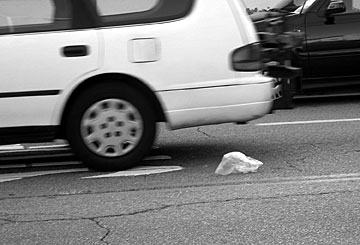
 |
|
|
|
State bill would ban single-use plastic bags
August 2010 by Lesli Daniel Californians use approximately 19 billion single-use plastic bags each year. However, less than 5% of all single use plastic bags are recycled. Instead, many of these plastic bags become litter in our oceans and our communities. The California legislature is poised to pass a bill banning single-use plastic bags, and the Governor has said he’ll sign it. But there is stiff opposition from the American Chemistry Council and other industry groups. Additionally some local jurisdictions have banned single-use plastic bags or are investigating local ordinances. Santa Cruz County is currently investigating such a ban. San Francisco enacted a limited ban in 2007 at large grocery and drug stores and is discussing expanding the ban to more retail stores such as hardware and department stores.  Plastic bags were the most common plastic item found in the digestive tracts of leatherback turtles. Photo: Debbie Bulger Environmental impacts of single-use bags: Ocean Pollution: An estimated 60-80% of marine debris is from plastics, and 90% of the floating debris is plastic. Eliminating single-use plastic bags is one way we can stop growing the North Pacific Trash Gyre, which is now estimated to be the size of the United States. Litter: The aerodynamics of single-use plastic bags have made them a huge source of litter. They are the second most common waste collected during coastal cleanups. Hidden Costs: You might think that single-use bags are free, but it is estimated that to cost $18–$30/year on your grocery bill. Then there are the millions of taxpayer dollars spent on litter abatement and recycling. Harm Wildlife: Plastic bags (which resemble jelly fish in the water) or pieces of plastic bags can easily be mistaken for food or prey by seabirds, marine mammals, fish, and sea turtles. Littered plastic items harm hundreds of wildlife species. Plastic bags were the most common plastic item found in the digestive tracts of 408 leatherback sea turtles according to a 2009 study that reviewed historical necropsies. Recycling isn’t the answer. The California Legislature enacted a law in 2006 that required grocery stores and pharmacies to recycle single-use bags, but that program is capturing less than 5% of bags. AB 1998 would: At press time this bill was on suspension in the Senate Appropriations Committee. To learn more, visit www.HealTheBay.org. |
|